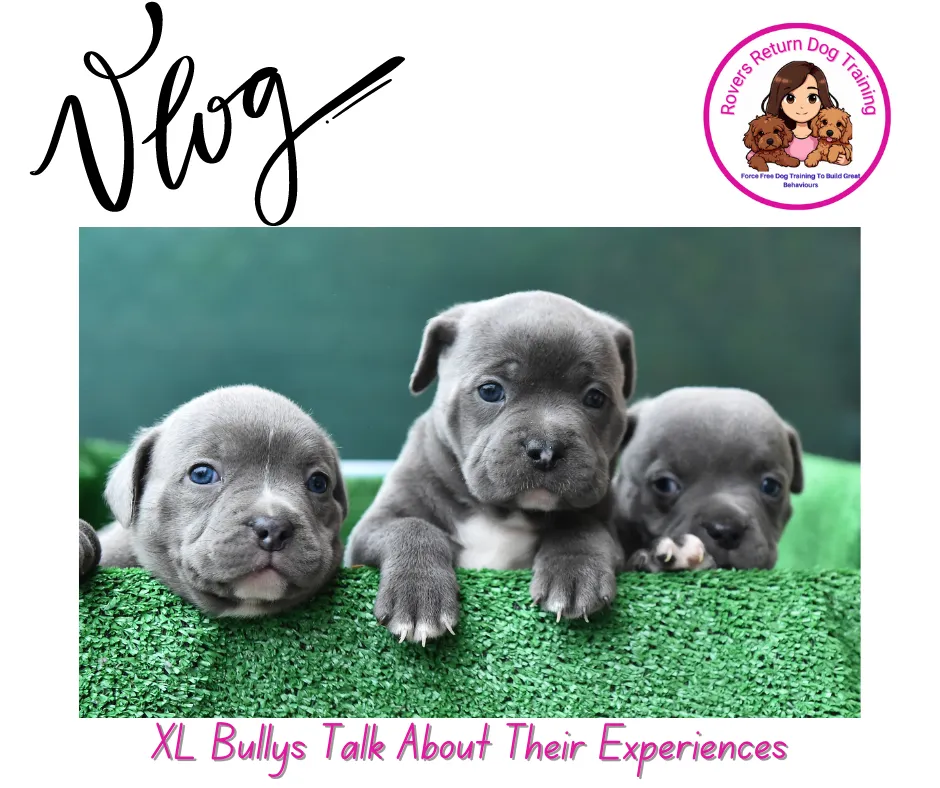Book a FREE 1:1 Assessment Call By Clicking HERE
Specialising In Dog Reactive Behviour
Accredited by APDT, ABTC and UK DOG Behaviour and Training Charter
Qualified and Experienced
Force Free Trainer and Behaviourist
Dog Training Leicestershire Educational Blogs

XL Bully Owners Despair Due To The Ban
Breed-specific legislation (BSL) is a set of laws or regulations that restricts or bans certain dog breeds deemed 'dangerous' or 'aggressive'. Unfortunately, bully breeds are often targeted by these laws..”
Is The Bully Breed Aggressive?
Introduction:
As dog lovers, we often hear about the controversy surrounding "bully breeds". These breeds, which include Pit Bulls, American Staffordshire Terriers, and Bulldogs among others, have been the subject of much debate. The question that often arises is: Are bully breeds aggressive by nature? This blog post aims to shed light on this issue by exploring dog aggression, breed-specific legislation, and the importance of responsible pet ownership.

The XL Bully breed has been at the centre of a heated debate regarding breed-specific legislation (BSL) and bans in the UK. This controversy stems from concerns about public safety, responsible ownership, and the potential for discriminatory measures against specific dog breeds.
Bully breeds have been unfairly stigmatized as being inherently dangerous or aggressive due to misinformation and media sensationalism. In reality, studies have shown that bully breeds are no more likely to bite than other breeds. In fact, many bully breeds score higher on temperament tests than other popular dog breeds.
The Role of Breed-Specific Legislation
Breed-specific legislation (BSL) is a set of laws or regulations that restricts or bans certain dog breeds deemed 'dangerous' or 'aggressive'. Unfortunately, bully breeds are often targeted by these laws.
The problem with BSL is that it focuses on the breed rather than individual dogs' behaviour. It assumes that all dogs of a particular breed are dangerous without considering other factors like the dog's upbringing, training, and socialisation. This approach is not only unfair but also ineffective. Studies have shown that BSL does not reduce dog bites or make communities safer.
Instead of breed-specific legislation, a more effective approach would be to implement laws that promote responsible pet ownership and hold owners accountable for their dogs' behavior.
You may not have heard of the dangerous dog coalition, I hadn’t until recently. It is made up of the Blue Cross, Battersea, Dogs Trust, Hope Rescue, Scottish SPCA, The Kennel Club and the British Veterinary Association. They campaign against breed-specific legislation and believe that the Dangerous Dog Act, in its current form, is not fit for purpose, they oppose the ban on dog breeds.
The coalition wrote to the government before the ban urging them not to ban the breed, but instead to come up with an alternative method to keep the public safe.
Here is an excerpt from the letter to the government.
The Dog Control Coalition agrees that urgent action needs to be taken to protect the public from out-of-control dogs, but we are disappointed that the Government hasn’t taken the opportunity to completely overhaul the Dangerous Dogs Act. With its continued focus on specific breeds, rather than a focus on prevention and implementation of tougher penalties for those owners not in control of their dogs, it is not fit for purpose.
Here is a copy of their letter to parliament which was ignored.
As a dog behaviourist, I do not define a dog's behaviour on breed alone.
Dog aggression is a complex issue that cannot be attributed to a single factor. It's essential to understand that any dog, regardless of its breed, can exhibit aggressive behaviour under certain circumstances. Factors such as genetics, training, socialisation, diet health conditions, pain, and even the dog's environment can contribute to aggressive behaviour.
Unless we identify all the contributing factors toward the behaviour through a thorough assessment, we will never know why or successfully train the dog.
Many experts advocate for a shift in focus from breed-specific legislation to more comprehensive approaches to dog ownership. Responsible dog ownership, proper training, and socialisation are considered key components in reducing the risk of dog-related incidents for all breeds of dogs.
We could look at education campaigns, community outreach programs, and incentives for responsible dog ownership, these have been suggested as alternatives to breed-specific bans but ignored.
By addressing the root causes of incidents, advocates argue that communities can create safer environments without resorting to blanket prohibitions on specific breeds. Banning on breed alone and offering no education for dog owners is the reason why this ban will fail.
I decided to record this vlog after spending time on various XL bully FB pages. It was clear to me that owners are struggling with their mental health due to the ban. They are getting trolled online, and threatened and generally feel unsupported and abandoned.
I interviewed two XL bully owners and asked about their experiences, owning a banned bully breed.
Laura has an XL bully puppy and to keep him safe has made the difficult decision to leave her home and boyfriend and move back to Italy where there is no ban and Vikki who rescued her XL bully who is no longer able to go to his day care that he loved and won't walk him without a camera in fear that he will be accused of harming someone.
I recorded the interview
Conclusion: Are Bully Breeds Aggressive?
The answer is no; bully breeds are not inherently aggressive. Like any other dogs, their behaviour largely depends on how they're raised, trained, socialised, and cared for by their owners.
It's time we move away from breed-specific stereotypes and focus on promoting responsible pet ownership instead. After all, every dog deserves to be judged based on its behavior rather than its breed.
Remember: There are no bad breeds; only bad deeds. Let’s strive for understanding over fear; education over ignorance; love over prejudice – because every good boy (or girl) deserves a chance to shine!
Highly Qualified Behaviourist
Accredited by APDT, ABTC and UK DOG Behaviour and Training Charter
Accredited Scentwork Instructor
Force Free Trainer and Behaviour
Force Free Trainer and Behaviour
Accredited Scentwork Instructor
Accredited by APDT, ABTC and UK DOG Behaviour and Training Charter
Highly Qualified Behaviourist
Contact Us
Sam: 07725 802995
You can contact us via Live Chat button at the bottom of the screen or the contact box to the right.
You can also book one of our services online using the View Dates buttons under the service you require.
© 2023 by Rovers Return Dog Trainers Academy - Force Free Dog Training Lutterworth, Broughton Astley, Leicestershire, Hinckley, Nuneaton, Stoney Stanton, South Kilworth, Ullesthorpe
Privacy Policy | Terms and Conditions | Terms and Conditions of Services | Sitemap


Facebook
Instagram
X
LinkedIn
Youtube
TikTok